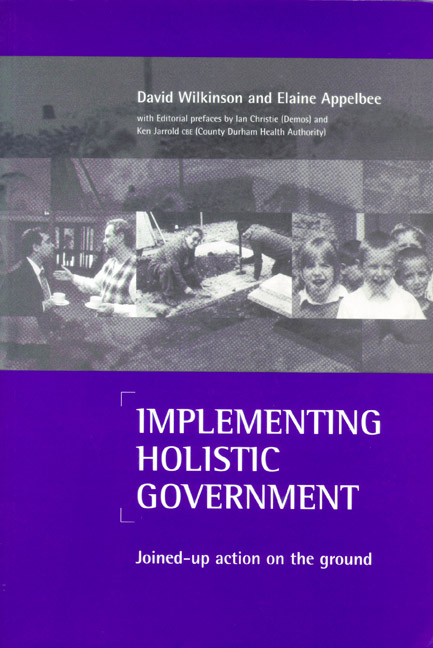Book contents
- Frontmatter
- Contents
- Editorial preface
- Editorial preface
- Acknowledgements
- Summary
- 1 Setting the context
- 2 The functional inheritance and its consequences
- 3 The public service, community interface
- 4 Change that works – sustaining community and quality of life improvement
- 5 Change that works – sustaining organisational and whole system change
- 6 Developing the middle ground: where bottom-up meets top-down (a third way for local governance?)
- 7 Improving sustainable quality of life: the benchmark for Best Value
- 8 Joined-up action on the ground: six key issues that have to be addressed
- 9 Working in the middle ground: recommendations to promote joined-up action on the ground
- References
5 - Change that works – sustaining organisational and whole system change
Published online by Cambridge University Press: 05 July 2022
- Frontmatter
- Contents
- Editorial preface
- Editorial preface
- Acknowledgements
- Summary
- 1 Setting the context
- 2 The functional inheritance and its consequences
- 3 The public service, community interface
- 4 Change that works – sustaining community and quality of life improvement
- 5 Change that works – sustaining organisational and whole system change
- 6 Developing the middle ground: where bottom-up meets top-down (a third way for local governance?)
- 7 Improving sustainable quality of life: the benchmark for Best Value
- 8 Joined-up action on the ground: six key issues that have to be addressed
- 9 Working in the middle ground: recommendations to promote joined-up action on the ground
- References
Summary
… organizational learning is not the same thing as individual learning, even when the individuals who learn are members of the organization. There are too many cases in which organizations know less than their members. There are even cases in which the organization cannot seem to learn what every member knows. (Argyris and Schon, 1978, p 9)
Sustaining organisational change
[This section is adapted from Whole system development by David Wilkinson, Margaret Attwood and Mike Pedler (1999: forthcoming) to be published by Lemos & Crane and from ‘Whole system development: rethinking public service management’ by David Wilkinson, published in the International Journal of Public Sector Management.]
If we wish to tackle the obdurate ‘wicked issues’, to address the essential requirement to rebuild social cohesion, to place more emphasis on prevention rather than just on cure, then this has deep transformational implications for how the delivery agencies in particular define their roles in service delivery. It also has significant ramifications for how all stakeholders work together and apart. But the emphasis here will be on the public service bodies and local government in particular because their impacts are clearly so significant.
The current domination of vertical, silo-based cultures in most of the public services has been discussed in Chapter 2. The focus on improving service efficiency and effectiveness has been predominantly within these ‘tower blocks’ and directed around functional and ‘easily counted’ output measures. The guiding rationale can be described as managerialist and consumerist (see notes in Chapter 2). In general there has been a far greater requirement to seek customer satisfaction, which is of course a step in the right direction. But there are also severe limitations with this approach. For instance, it is likely that many local authorities will approach Best Value from this position and submit an increasing proportion of silo-based services to best value scrutiny. But this is unlikely to help the holistic requirement of the community agenda. Worse, it is likely to focus staff attention in entirely the wrong direction.
A community focused agenda clearly requires local integration of service professionals around community-based agendas. It is, for the most part, a radically different way of working across professional boundaries with a radically different working relationship with service users in the community.
- Type
- Chapter
- Information
- Implementing Holistic GovernmentJoined-Up Action on the Ground, pp. 67 - 90Publisher: Bristol University PressPrint publication year: 1999



